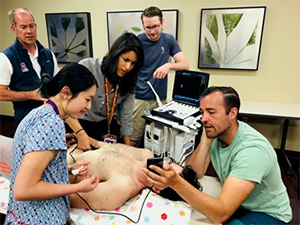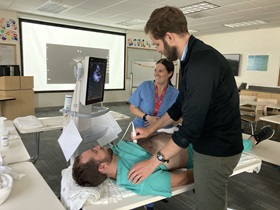Education Sessions
 Med-Peds Academic Half Days:
Med-Peds Academic Half Days:
As part of our clinic curriculum, we offer Med-Peds-specific academic half days with an emphasis on ambulatory education and practical clinical skills. These sessions provide protected time for Med-Peds-specific education across all four years of residency training and are consistently rated highly by our residents.
Academic Half Days are built around adult and pediatric ambulatory medicine, with topics informed by In-Training Exam (ITE) performance, resident interests, and evolving clinical needs. They are also a space for piloting innovative educational ideas that are resident-driven and faculty-supported. We are a program that values innovation, reflection, and meaningful teaching.
Key Features:
- Ambulatory Focus: Emphasis on outpatient medicine with content tailored to both pediatric and adult primary care.
- Resident-Led Teaching: We intentionally scaffold teaching experiences throughout residency, allowing residents to grow as educators and receive mentorship and feedback.
- R2 – Classroom Teaching 101: Residents choose a clinical topic, develop learning objectives, and present with peer and faculty feedback.
- R3 – Clinical Question Case Conference: Residents critically appraise literature with mentorship to answer a real-world clinical question.
- R4 – Morbidity & Mortality Conference: Senior residents lead M&M sessions focused on root cause analysis and cognitive bias in clinical decision-making.
Curricular Threads:
- REACH: Sessions are guided by the principles of our REACH curriculum (Race, Equity, and Advocacy in Community Health), which emphasizes community-based learning and advancing health equity through education.
- Addiction Medicine Series: Developed in partnership with the University’s addiction medicine faculty.
- Art in Medicine Series: Creative reflection and narrative medicine exercises that explore the human side of care.
POCUS Curriculum:
In 2022, we created a dedicated POCUS curriculum for our interns with an overarching goal of providing them with the knowledge and skills necessary to interpret, perform, and integrate POCUS into their clinical practice to better care for patients. Over the course of this year-long curriculum, interns practice lung, cardiac, and abdominal POCUS, with a additional focus on procedural ultrasound. The curriculum consists of multiple half-day sessions during which residents complete online didactic modules and then receive mentored scanning with Med-Peds faculty. Interested residents also have the opportunity to create a portfolio of images, and then receive asynchronous feedback on the quality of these images from expert faculty. In addition to this Med-Peds-specific curriculum, interns participate in various components of the categorical IM and Pediatric POCUS curricula.
In the R2-4 years, residents have the opportunity for ongoing mentored scanning with POCUS-trained faculty members, and also get dedicated practice during some Med-Peds academic half-day sessions. Additionally, residents are able to take an advanced POCUS elective and/or obtain their Advanced POCUS Certificate through the IM program.

Procedural Curriculum:
Residents have ample opportunities to obtain procedural competence over the course of their training. Importantly, we encourage residents to tailor their procedural training to meet their specific career needs. Those interested in hospital medicine or a subspecialty like Pulm/Crit are able to participate in procedure sim trainings, rotate on ward rotations specifically designed to provide additional procedural experience, participate in procedure clinics during RAC, and take a procedure elective to gain competence in paracenteses, thoracenteses, lumbar punctures, arterial lines, and central lines. Those interested in primary care are able to receive training on Nexplanon and IUD insertion, complete a sports medicine or rheumatology elective to gain additional experience with joint injections, or complete a dermatology elective to gain experience with lesion biopsy and removal. Whatever your procedural interest, we’ve got you covered!
Med-Peds Noon Conference:
Our Med-Peds Noon Conference serves as another fun opportunity to get our residency crew together with our fabulous Med-Peds faculty members. This conference, which is held around 6 times per year, serves as forum for our local Med-Peds faculty to present a variety of educational content to our group. The curriculum tends to focus on inpatient management of various conditions, though it covers other topics as well. Over the past few years we’ve learned about chronic trach/vent care and the differences between pediatric and adult asthma management from our esteemed Med-Peds-trained Pulm/Crit faculty, discussed the evolving landscape of global health work with an experienced MSF physician, and learned about the past, present, and potential future of programs like Medicaid and Medicare from one of our Med-Peds Hospitalists, among many other terrific topics!
Pediatric Academic Half Days and Humanism and Resiliency Curriculum:
When on pediatric rotations, residents participate in monthly pediatric-specific didactic half days. These take place in the afternoons and are protected time (no secure chats to answer or clinical responsibilities to worry about). Academic half day sessions cover a wide range of clinical topics and also include some simulation training. During these sessions, residents have the opportunity to interact with some of the best faculty teachers from across campus in an interactive, small-group setting. These are always highly reviewed by our residents!
The Humanism and Resiliency Curriculum is an opportunity to spend dedicated time focusing on many traditionally underemphasized yet critically important topics for the future Pediatrician. Sessions cover ethical dilemmas, dealing with death and bad outcomes, resiliency tips and tricks, and so much more!
Medicine WES (Wednesday Education Sessions) and Pathways:
When on medicine electives, residents participate in weekly medicine-specific education sessions called Wednesday Education Sessions (WES). In the intern year, these sessions cover a wide variety of topics including resident wellness and resiliency, implicit bias training, diagnostic reasoning, and critical appraisal of the medical literature. In the 2nd through 4th year, sessions are divided based on career interest (research, hospitalist, primary care, subspecialty) and use small interactive group and case-based learning formats.
Med-Peds residents are also able to participate in any of the multitude of pathways offered to IM and Peds categorical residents. For example, on the IM side sign up for the Global Health, Health Equity, Advocacy & Policy, Medical Education, Medical Leaders, or Research & Investigation Pathways, while on the Peds side residents can participate in the Global Health Pathway or Medical Educator Pathway .
.
Noon Conference, Morning Report, M&M, and Grand rounds:
In addition to the above, residents have the opportunity to participate in a variety of enriching conference-style didactics. On the IM side, residents attend noon conference, while on the Peds side residents attend Morning Report. Each of these sessions are led by the phenomenal chief residents in each categorical program, and are a great opportunity to learn from senior faculty members who also attend. In addition, residents attend Grand Rounds and M&M conferences on both Peds and IM rotations.